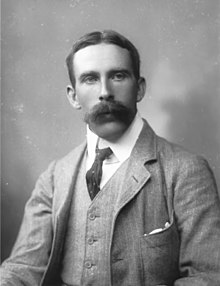Arthur George Tansley
Sir Arthur George Tansley (born August 15, 1871 in London , † November 25, 1955 in Grantchester / Cambridgeshire ) was a British plant ecologist and geobotanist. Its official botanical author abbreviation is " Tansley ".
Life
Tansley studied in the years 1889 and from 1893 to 1895 at the University of London and from 1890 at Trinity College , Cambridge , where he took his exam in 1894. From 1900 to 1901 he went on a research trip to Ceylon and Malaya . As early as 1902 he founded the later famous journal " The New Phytologist ", which he published until 1931. In 1907 he became professor of botany at Cambridge University and in 1911 published " Types of British Vegetation ". In 1913 he founded the " British Ecological Society ", of which he was subsequently also president. In 1917 he founded the journal " Journal of Ecology " and was the editor of the magazine for the next 21 years. From 1927 to 1937 Tansley was Professor of Botany at Oxford University and in 1929 organized the International Congress of Plant Sciences in Ithaca , New York . In 1939 he was elected President of the British Ecological Society . In 1936 he was elected a member of the Leopoldina . Other functions were the presidency of the " Council for the Promotion of Field Studies " (1947) and the chairmanship of the " Nature Conservancy Council " (1949–1953).
Tansley's main publications are " The Use and Abuse of Vegetational Concepts and Terms " (1935) and " The British Islands and their Vegetation " (1939). In 1941 Tansley received the gold medal of the " Linnean Society of London ". In 1950 he was knighted.
"The Use and Abuse of Vegetational Concepts and Terms"
Tansley introduced the term " ecosystem " in the biological sciences in 1935 (in " The Use and Abuse of Vegetational Concepts and Terms "). In this paper, published in the journal Ecology appeared, he analyzed the benefits and opportunities for abuse vegetation science ideas to some of the holism influenced forms of thought that were prevalent at that time without reflection in the bio-ecology rejected.
His article was a response to a treatise by the botanist John Phillips, who researched in southern Africa and was influenced by Jan Christiaan Smuts , who propagated the ideas of the super-organism and the biocenosis . Tansley accepted that these "tissues of life ... adapted to particular complexes of environmental factors ... [and] are real 'wholes' (often highly integrated wholes) that are the living kernels of systems in the physicist's sense." In Tansley's view, however, they cannot be described as 'organisms'.
Instead, Tansley suggested that "they - together with the whole of the physical factors they contain - should simply be viewed as systems." Because the "inanimate factors" would have to be included in the ecological analysis. In these ecosystems "there are various types of interaction, not only between organisms, but between animate and inanimate." (quoted in Schramm 1984: 198f.)
Works
- The New Psychology And Its Relation To Life . Kessinger Publishing, 2007. ISBN 9780548155134
- " The Use and Abuse of Vegetational Concepts and Terms ". Journal Ecology , Vol. 16, No. 3 (July, 1935), pp. 284-307.
- "The British Islands and their Vegetation" (1939)
swell
- Frank B. Golley (1993): A History of the Ecosystem Concept in Ecology. New Haven: Yale University Press
- Engelbert Schramm (1984): Ecology Reading Book. Selected texts on the development of ecological thinking. Frankfurt a. M .: S. Fischer
- Ludwig Trepl (1986): History of Ecology. Frankfurt a. M .: Athenaeum
Web links
- Author entry and list of described plant names for Arthur George Tansley at the IPNI
| personal data | |
|---|---|
| SURNAME | Tansley, Arthur George |
| BRIEF DESCRIPTION | British plant ecologist and geobotanist |
| DATE OF BIRTH | August 15, 1871 |
| PLACE OF BIRTH | London |
| DATE OF DEATH | November 25, 1955 |
| Place of death | Grantchester , Cambridgeshire |
